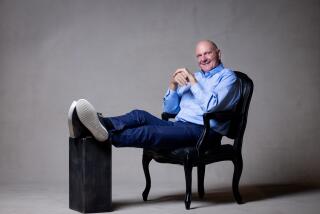Empire IN THE Desert
- Share via
He’s always impeccably dressed in tailored suits, drives fancy sports cars, has homes around the country and is without question the most powerful businessman in town.
But Jerry Colangelo, who owns a controlling interest in the Phoenix Suns and Arizona Diamondbacks, says his upbringing in a poor Italian neighborhood in Chicago Heights, Ill., keeps his feet on the desert floor and ego in check.
“That gives me my foundation,” Colangelo says.
As he speaks, he points to a corner of his spacious office in America West Arena, where he keeps mementos of his childhood, including a photo of the simple home where his house-painter father and textile worker-mother raised him and a sister.
“I’m still the same guy from the old neighborhood. I have to keep reminding myself of that all the time,” he said. “You can’t lose sight of who you are or where you came from.”
Nearly 30 years after he arrived in Phoenix with his wife, Joan, “three young children, about eight suitcases and a couple hundred bucks in my pocket” to become general manager of the fledgling Suns, the 57-year-old Colangelo commands an empire that is the envy of pro sports.
Under Colangelo’s guidance, the Suns have become one of the NBA’s most profitable teams thanks to savvy marketing and rabid fans who have filled every seat for every game played in the 19,023-seat arena since it opened in 1992.
The franchise also has a financial stake in the Arizona Rattlers of the Arena Football League, the Phoenix Mercury of the WNBA, the management of America West Arena, an athletic club, a video production company, and Team Shops, a chain that sells sports gear.
And now Colangelo is transforming the downtown Phoenix skyline with Bank One Ballpark, where his Diamondbacks will play next spring before sellout crowds of nearly 50,000.
The $350 million stadium, with an ornamental red brick-and-steel design like ballparks of old, features a retractable roof that will open on perfect spring days and close to seal out summer’s blistering heat. There’s even real grass, a microbrewery and a swimming pool behind the left-field fence.
Tall and slender, Colangelo was a solid big-league prospect as a pitcher in high school before injuring his arm. He later was an All-Big Ten basketball player at Illinois.
He earned a degree in education and figured he’d go the teacher-and-coach route for a career. But after running a dry-cleaning business and playing semi-pro basketball for a few years, the Chicago Bulls hired him as head scout and director of merchandising in 1966 in their first year in the league, “when the NBA was very unsophisticated,” he said.
Colangelo took a few economics courses in college, but says his real business education came on the job, particularly when he and Bulls president Dick Kline sought investors to raise the $1.5 million NBA franchise fee.
“We were ushered out the door quite a few times,” he recalled. “I sat in with Dick and potential investors and met people like Lamar Hunt, Harold Mayer of Oscar-Mayer Co. and Dan Searle of Searle Pharmaceuticals. I felt very comfortable with those people.”
Two years later, at 28, Colangelo became the youngest general manager in pro sports when he joined the Suns.
He held the post until 1987, when he led a group of investors that bought the Suns for $44.5 million. The franchise is now worth about three times that amount, with Colangelo holding a 36% controlling interest.
Colangelo, a four-time NBA Executive of the Year, says it was purely an accident that he became an owner of sports teams.
“This has not been a master plan,” he says. “This is being involved with something you love, putting all of your energy into it and having the ability to recognize opportunities when they presented themselves.”
Jerry Reinsdorf, owner of the Chicago Bulls and Chicago White Sox, says Colangelo is intelligent and works hard, but above all, is driven to succeed.
“He has an intense desire to excel at whatever he does. That just makes him work a little harder than most people,” says Reinsdorf, a good friend of Colangelo’s.
In 1993, community leaders approached Colangelo about heading a drive to bring major league baseball to Phoenix. Colangelo assembled a group of investors who paid $130 million for an expansion franchise in 1995.
Colangelo deserves credit for almost single-handedly transforming Phoenix from a small town into America’s sixth-largest city, says Ioanna Morfessis, former president and CEO of the Greater Phoenix Economic Council.
” Because of his risk-taking, Phoenix is a lot further along as a sports and cultural center,” she says.
Colangelo is not without detractors, although few criticize him publicly. Some consider him power hungry and complain that he, not the city or Maricopa County, fared better financially in negotiations over the construction and operation of America West Arena and Bank One Ballpark.
Colangelo also has been vilified by opponents of a countywide quarter-cent sales tax increase authorized by the Maricopa County Board of Supervisors without a public vote to help pay for the ballpark.
“The one thing I feel badly about is that there are a lot of people out there who think I created this tax and it was for my benefit and I have all of my so-called power-broker friends in this community as my partners in it who are getting the same benefit,” he said.
“It’s anything but that.”
Colangelo said it’s flattering to be considered the city’s most powerful figure, but it’s a title he’s achieved almost by default. Phoenix is a transient city whose political and corporate leadership is constantly turning over.
“I’m a survivor in a community where everyone else has come and gone. . . . Through attrition, there wasn’t anyone else standing.”
More to Read
Go beyond the scoreboard
Get the latest on L.A.'s teams in the daily Sports Report newsletter.
You may occasionally receive promotional content from the Los Angeles Times.










